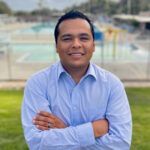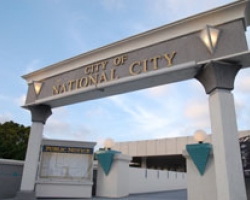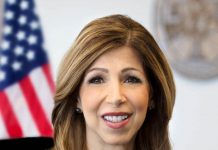City Council member Jose Rodriguez is running for Mayor of National City because he believes he can better direct the city toward affordable housing, community investment and a more satisfied community.

“We deserve better. It’s time we build units for our residents at reasonable prices. We recently have been building more and more market rate properties— luxury apartments really— on city owned property. We cannot get out of this housing crisis by building gilded, expensive rentals,” Rodriguez said.
The 37-year old real estate professional said he’d take two approaches to city policy in an effort to bring more affordable housing to the city.
First, Rodriguez said, the city needs to advocate for ownership opportunities by developing public land for sellable homes at reasonable prices rather than rentals.
“If we look at the recent sales market, there were only 3 units under $500,000 and they were condos. Young families are looking forward to buying but they’re squeezed out of the market. Luxury apartments are making a ton of wealth for investors but they’re not generating wealth for our residents,” Rodriguez said.
Second, Rodriguez said, the city must enact an affordable housing covenant.
“We don’t have an affordability covenant as they do in other cities where 10 to 15 percent of the units are set aside for affordable housing. Because we don’t have that, developers create units that are all offered at 100 percent market rate,” Rodriguez said.
He contrasted that situation to San Diego where “developers have to build affordable units or pay an in-lieu fee”, monies paid to the city in exchange for not including affordable units.
According to the California department of housing and community development, in-lieu fee formulas typically take into account local housing prices for very low, low or moderate-income earners as well as the comparable market rate units and the percentage of units required under the inclusionary housing provision.
Ostensibly, requiring that fee either results in affordable housing or generates city funding to help residents obtain affordable housing in a different development.
“We don’t have any of that so developers can build apartments that are $2900 for two bedrooms. That is more than a mortgage payment,” Rodriguez said, and a big misstep for the city.
The city also needs to invest in infrastructure, he said, to entice new businesses into setting up local shops and support the community. Dirt alleys, broken streetlights, and poorly maintained roads are unacceptable, he said, and the city needs to invest in itself.
“I walk around the city, ask people what they want and it’s basic: we need to increase our quality of life. We need to make sure we take care of our public roads, we need basic quality of life investments in our city. It creates a more pleasant environment but also incentivizes investments into the city,” Rodriguez said.
Additionally, he said, the city needs to invest in programming at municipal facilities.
“Our recreation centers and Camacho gym have been closed for years because we don’t offer any programming. Public spaces belong to the public and we need to make them accessible with things for kids, families, seniors— those public spaces need to be teeming with life,” Rodriguez said.
The city approved $2.25 million in American Rescue Plan Act funds for facility improvements in October, 2021, then was granted an additional $2 million from the state of California in November, 2021 to be spent on repairs and improvements for Las Palmas pool. Mayor Alejandra Sotelo-Solis suggested at the time that some of the funding might be used to develop a wellness center connecting the pool area and adjacent Camacho Recreation Center.
However, the lack of programming at city facilities is of concern, Rodriguez said, as that type of enrichment creates a more harmonious community with active and engaged kids as well as places where senior citizens can socialize with other people, an outlet which is “desperately needed” after the COVID pandemic.
If elected, he would also like to direct the city toward developing 20 empty, city-owned lots into pocket parks “to create a better quality of life” for residents.
“This is going to sound simplistic but really, we need to plant and take care of more trees to improve our air quality. We’ve seen older trees die off but haven’t replaced them, and that’s an oversight with very serious consequences. Trees not only generate oxygen and reduce carbon dioxide, they also produce shade, reduce temperatures and increase property values,” Rodriguez said.
Less simplistically, he said, are “things we’ve put on a shelf for a decade like the idea of making sure we actually remove the toxic west side businesses” which contribute to pollution.
At the same time, Rodriguez, who previously advocated for using ARPA funding toward small business grants, said the city needs to continue to support small businesses that survived the pandemic.
“As a city, we have to be as accommodating as possible. If someone wants to open a business, they have to get a permit. We should help them get their permit so they open in a timely manner and we need an efficient process to get that going,” Rodriguez said, although he did not say what he would do to facilitate a speedier permitting process.
The city would benefit from downtown foot traffic in the downtown district, he said, in the form of festivals or events which would bring shoppers into the area to support business development.
To support business development near the port, he would like to open up access to the bay.
“We have 150 acres of port tideland that is utilized to park cars. We’re the only city in the region without access to our bay and we need to develop it because it means revenue for the city and local jobs. We don’t have abundant land, we need to look at the space we have and reinvent ourselves with a broader vision when it comes to utilizing our very small bit of land,” Rodriguez said.
He is glad to see the San Diego Rescue Mission plans to open a transitional living center to shelter homeless residents and said he considers it “a good start” because he supports their faith based component, but he also noted the facility is independently funded so it benefits the city without adding to expenditures.
Regionally, he said, leaders need to make sure cities are addressing homelessness together so people are off the streets and permanent solutions are in place for people with no income.
Generally, one last change he would like to make at city hall is to implement a culture shift to public servitude, in part by encouraging empathy. People get disillusioned by the government when they perceive they aren’t being heard, he said and if there is any restructuring to be done it is in the city’s attitude rather than major policy changes.
“When we have community members that need help, we need to be accommodating. People report something that needs fixing and it doesn’t happen; they call and nobody answers. We need to put ourselves in the position of everyday people, listen to community needs and actually prioritize what residents are asking for,” Rodriguez said.
Rodriguez was vocal in his support of replacing at-large elections with district-based representation to ensure city council members live across the city and represent their immediate community. He was elected to the dais in 2020 and has already filed campaign papers for a 2024 run for city council.
Although he is running as a non-partisan candidate, Rodriguez is endorsed by the San Diego County Democratic party, the Democratic Woman’s Club of San Diego, San Diego Labor Democratic Club, and San Diego Democrats for Equality along with Planned Parenthood Action Fund, The Sierra Club and several local unions.















